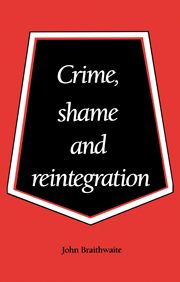Book contents
- Frontmatter
- Contents
- Preface
- 1 Whither criminological theory?
- 2 The dominant theoretical traditions: labeling, subcultural, control, opportunity and learning theories
- 3 Facts a theory of crime ought to fit
- 4 The family model of the criminal process: reintegrative shaming
- 5 Why and how does shaming work?
- 6 Social conditions conducive to reintegrative shaming
- 7 Summary of the theory
- 8 Testing the theory
- 9 Reintegrative shaming and white collar crime
- 10 Shaming and the good society
- References
- Index
9 - Reintegrative shaming and white collar crime
Published online by Cambridge University Press: 05 June 2012
- Frontmatter
- Contents
- Preface
- 1 Whither criminological theory?
- 2 The dominant theoretical traditions: labeling, subcultural, control, opportunity and learning theories
- 3 Facts a theory of crime ought to fit
- 4 The family model of the criminal process: reintegrative shaming
- 5 Why and how does shaming work?
- 6 Social conditions conducive to reintegrative shaming
- 7 Summary of the theory
- 8 Testing the theory
- 9 Reintegrative shaming and white collar crime
- 10 Shaming and the good society
- References
- Index
Summary
The theory of reintegrative shaming is unlike other theories of crime in the literature, with the notable exception of differential association, in that it does not exclude white collar crime from that which is to be explained. There is of course nothing wrong with having a theory of a subset of crime, so long as a theory of rape, for example, is described as a theory of rape rather than as a general theory of crime. However, there has been a tendency in criminology to present as explanations of crime in general, theories that adopt a class-biased conception of crime that excludes white collar offenses. The latest example is Wilson and Herrnstein's (1985) theory of low IQ and impulsiveness, inter alia, as central to the ‘human nature’ of crime. Since one would expect most white collar criminals to be intelligent and scheming rather than stupid and impulsive, Wilson and Herrnstein's decision to be wilfully blind to the vast reality of white collar crime causes them to present as a general explanation of crime something which could not be sustained if confronted with the totality of the patterns of crime in society rather than with a class-biased subset of criminal behavior.
A theory of general applicability has arisen in this case because it was a theory generated originally out of my work on white collar crime with Brent Fisse and others.
- Type
- Chapter
- Information
- Crime, Shame and Reintegration , pp. 124 - 151Publisher: Cambridge University PressPrint publication year: 1989
- 1
- Cited by



